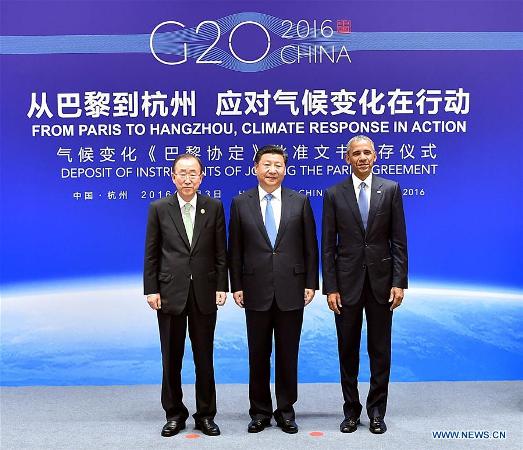Xi, Obama commit to climate deal
|
|
|
Chinese President Xi Jinping (C), U.S. President Barack Obama (R) and Secretary-General of the United Nations Ban Ki-moon attend the deposit of instruments of joining the Paris Agreement in Hangzhou, capital city of east China's Zhejiang Province, Sept. 3, 2016. |
The presidents of China and the United States met with UN Secretary-General Ban Ki-moon Saturday in Hangzhou to deliver their countries' instruments of joining the Paris climate pact.
Ban said that the joint move by China and the United States was significant and the contribution paved the way for the early entry into force of the Paris Agreement, the new framework for the world to achieve sustainable development.
Chinese President Xi Jinping said that climate change concerns the well-being and future of humanity. The Paris Agreement has charted the course for post-2020 global cooperation against climate change, indicating that a cooperative, win-win, equitable and fair climate governance mechanism is taking shape.
HISTORIC MOMENT
Depositing the documents together, China and the United States have displayed their ambition and determination to jointly tackle a global challenge, Xi said.
The handover of the legal document is evidence of China's solemn commitment, Xi said.
Taking advantage of the implementation of the Paris Agreement, the international community should boost efforts to improve the global governance mechanism and innovate relevant actions, to support the full operation of the agreement, the president said.
Developed countries should honor their commitments and provide financial and technological support to developing countries to enhance their capability to undertake climate action, Xi said.
China, a responsible developing country and an active player in global climate governance, will implement its development concepts of innovative, coordinated, green, open and shared growth; fully advance energy conservation, emission reduction and low-carbon development; and embrace the new era of ecological civilization, he said.
"Just as I believe the Paris Agreement will ultimately prove to be the turning point for our planet, I believe history will judge today's efforts as pivotal," U.S. President Barack Obama said.
He said that the United States and China had led by an example in climate action as they were the world's largest economies, giving the rest of the world confidence that a low-carbon world is the future.
A total of 178 parties of the UN Framework Convention on Climate Change have signed the agreement. However, for the pact to come into effect, ratification documents must be submitted by at least 55 parties representing 55 percent of global carbon emissions.
"Together the U.S. and China represent 40 percent of global emissions, so today we are moving significantly closer to the goal we have set," said Obama.
SIGNIFICANT OUTCOMES
A statement on climate change cooperation outcomes issued Saturday by China and the United States said that the two countries have forged a "historic partnership" in combatting climate change.
Respective strategies for mid-century, low-greenhouse gas emission development will be formulated and published, it said. Both agree to hold a series of technical exchanges on the formulation of such strategies, beginning this year.
The two countries support the Assembly of the International Civil Aviation Organization to reach consensus on a global market-based measure to address carbon emissions from international aviation this October, and expect to be early participants in such measure.
Both countries have enhanced domestic action to promote the transition toward green, low-carbon and climate-resilient economies, according to the statement.
To fulfill its commitment to the Paris Agreement on climate change, China will cut its carbon emissions per unit of GDP by 60 to 65 percent by 2030 from the 2005 levels, increase non-fossil fuel sources in primary energy consumption to about 20 percent, and peak its carbon emissions by 2030.
Within the next five years, China will lower its carbon dioxide per unit of GDP and energy consumption per unit of GDP by 18 percent and 15 percent respectively, increase the share of non-fossil fuels in primary energy consumption to 15 percent, and increase the forest stock volume by 1.4 billion cubic meters.
Energy efficiency in the country's industries, transportation and buildings will be increased while green power dispatch will be promoted to accelerate the development of renewable energy, the statement said.
China will also start in 2017 its national emission trading system, phase down the production and consumption of HFCs and promote low-carbon development of transportation by developing standard modern transportation equipment and energy-efficient, environmentally friendly means of transport.









Go to Forum >>0 Comments